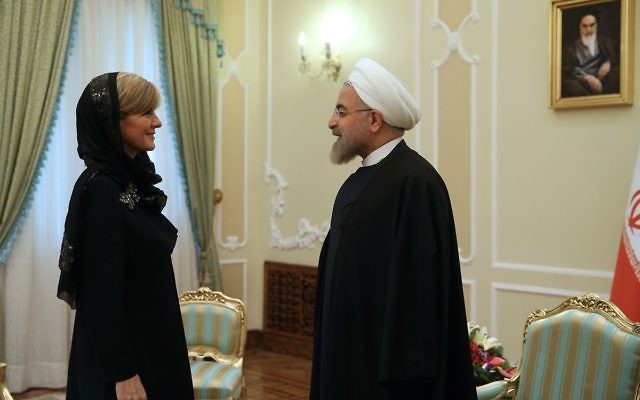Concern over Bishop Iran trip
FRESH concern has been expressed over Foreign Minister Julie Bishop’s trip to Tehran last weekend.
Following the visit, it was revealed that Bishop had agreed to share intelligence with Iranian authorities to help combat Islamic State in Iraq.
She also expressed confidence that a deal limiting Tehran’s nuclear capability, which would satisfy everyone including Israel, was within reach.
It was the first trip to Iran by an Australian minister for 12 years.
Reacting to Bishop’s visit, which included meetings with Iranian President Hassan Rouhani and Foreign Minister Javad Zarif, Colin Rubenstein, executive director of the Australia/Israel & Jewish Affairs Council, said: “We are concerned that this visit could, unintentionally, confer unwarranted, premature acceptance and undeserved legitimacy on an unreformed, repressive Iranian regime which notoriously abuses human rights, relentlessly reiterates its genocidal calls for Israel’s annihilation, fanatically propagates anti-Semitism, promotes terrorism and aggressively advances its regional hegemonic ambitions.
“There is no credible evidence of Iranian moderation or that Iran is only seeking civilian nuclear power while allowing adequate inspections that should satisfy everyone, including Israel, as Foreign Minister Bishop was told.
“A flawed or premature nuclear deal with Iran will not lessen but enhance its regional hegemonic ambitions, its state sponsorship of regional and global terrorism and its revolutionary Islamist ideology.”
Rubenstein added: “While seeking Iranian cooperation for elite Australian soldiers sent to train local Iraqi forces in the fight against Islamic State is understandable, it is important that this is done firmly in the context of strong efforts to convince, cajole or coerce the Iranian regime to cease its numerous destructive activities and threatening behaviour and genuinely relinquish its nuclear weapons program.”
Bishop also drew flak from some quarters for wearing a headscarf during the trip, with some commentators suggesting she should have shunned such headwear as a symbol of solidarity with Iranian women who have no choice but to wear head coverings.
Bishop insisted she often wore hats and scarves “as part of my everyday wear”.
Weighing into the debate, Opposition leader Bill Shorten asked, “Would they criticise Julie Bishop if she wore a scarf to meet the Pope? If I wore a yarmulke in Israel to certain events, I don’t think that would be inappropriate.
“It just makes common sense that when you go to someone’s house, or indeed someone’s nation, you’re just a bit respectful of the customs and traditions of the place that you’re visiting.”
AJN STAFF
Julie Bishop with Hassan Rouhani.


comments